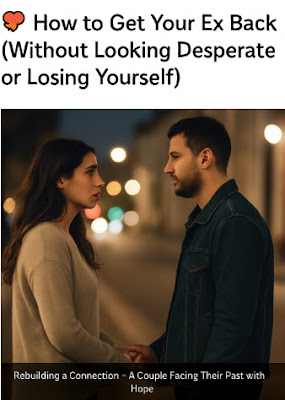🔍 Can This Relationship Be Saved? 10 Honest Questions to Ask Before You Decide
Wondering if your relationship can be saved is one of the hardest questions you’ll ever ask — because the answer won’t come from friends, memes, or timelines. It comes from facing truth, not fantasy.
📝 Quick Summary:
Can this relationship be saved? Before you seek outside advice, you need to ask yourself 10 brutally honest questions that clarify whether you're fighting for love or holding on to a memory. This post helps you see through the fog.
💡 Intro Paragraph:
Can this relationship be saved is the internal tug-of-war between "maybe it’ll change" and "maybe I deserve better." The truth is, some relationships can absolutely be rebuilt — but only if both people are willing to drop their ego, dig deep, and show up differently.
This post doesn’t give you the answer — it helps you find yours.
✅ 10 Questions to Reveal If It’s Worth Saving
✔️ Do you still respect each other when no one’s watching?
Because love without respect is manipulation.
✔️ Do both of you take accountability — or just one person?
If one person’s always apologizing and the other is always deflecting, it’s not repair — it’s survival.
✔️ Is the emotional damage temporary… or permanent?
Big fights happen. But if safety, trust, or identity has been eroded — healing may require more than a heart-to-heart.
✔️ Have you grown with each other — or just next to each other?
Drifting isn’t always visible until you look up and realize you’re on different islands.
✔️ When you think of the future, are you excited or exhausted?
Hope fuels effort. Dread fuels detachment.
✔️ Have you actually tried to fix things — or just waited?
Waiting for time to heal things without action is like waiting for muscles to grow without working out.
✔️ Are you staying out of love, or out of fear?
Fear of being alone, judged, or starting over aren’t good reasons to stay.
✔️ Would you want your kids/friends to have a relationship like yours?
Be honest. If the answer is no — that’s your sign.
✔️ Are you both willing to rebuild… or just one of you?
Rebuilding with one hammer doesn’t work. It takes two tool belts.
✔️ Do you still like each other?
You can love someone and no longer like who they’ve become — or who you’ve become with them.
❓FAQ Section
Q: Is every relationship worth saving?
A: No. Some are stepping stones to self-discovery. The goal isn’t just to “stay” — it’s to grow, together or apart.
Q: Can therapy save a toxic relationship?
A: Therapy can work wonders if both people want to change. If one is checked out or abusive — it may just prolong the pain.
Q: What if I’m scared to leave but miserable staying?
A: Fear of change is normal. But staying stuck is what actually steals your future.
Q: What if they’re willing to change, but I’m already over it?
A: Then you’ve got your answer. You don’t have to stay for someone else’s awakening.
🔗 Other Posts to Help With This Decision:
-
👉 When to Walk Away from a Relationship (replace with real bit.ly)
📘 Recommended Resource:
📕 Too Good to Leave, Too Bad to Stay by Mira Kirshenbaum – A classic read for anyone in limbo, with real-life clarity checklists.
🔐 Affiliate Disclaimer
This post may contain affiliate links. I may earn a small commission at no extra cost to you. I only recommend what can truly help your heart or your healing.
🧠 Staying Isn’t Success — Healing Is.
Love that’s meant to last will survive truth.
Love that’s meant to fade will fight truth.
You already know. Deep down, you already know.
Ask the questions. Trust the answers.




.jpg)
.jpg)
.jpg)
.jpg)
.jpg)
.jpg)



